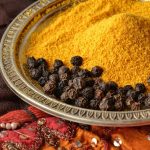Arthritis affects millions of people worldwide, causing pain, stiffness, and swelling in the joints. Finding effective relief from these symptoms can be a long and challenging journey for many. In recent years, turmeric has gained significant attention as a potential remedy for arthritis due to its powerful anti-inflammatory properties. This article delves into the science behind turmeric and its active compound, curcumin, explores its benefits for arthritis patients, and provides practical advice on incorporating this spice into your daily routine for optimal results.
Understanding Turmeric and Curcumin
Turmeric is a bright yellow-orange spice used for centuries in Indian and Middle Eastern cuisine. It is derived from the root of the Curcuma longa plant, a member of the ginger family. The active compound in turmeric responsible for its health benefits is curcumin, which makes up approximately 3-5% of the spice.
Curcumin is known for its potent anti-inflammatory and antioxidant properties. These characteristics have led researchers to investigate its potential in treating various conditions, including arthritis. However, it is essential to note that the turmeric used in cooking contains only a small amount of curcumin. Higher doses of curcumin are typically required to achieve therapeutic effects, which can be obtained through supplements.
The Science Behind Turmeric and Arthritis
Curcumin's anti-inflammatory properties have been extensively studied, and multiple clinical trials have demonstrated its effectiveness in reducing inflammation and pain associated with arthritis. In particular, curcumin has been found to inhibit specific molecules that play a vital role in the inflammatory process, such as cytokines and enzymes like COX-2.
Several studies have shown that higher doses of curcumin supplements, around 1,000 milligrams (mg) per day, can provide relief similar to nonsteroidal anti-inflammatory drugs (NSAIDs) commonly prescribed for arthritis. For instance, a systematic review and meta-analysis of randomized clinical trials found that turmeric extracts and curcumin effectively alleviated symptoms of joint arthritis, including pain and stiffness.
One notable study published in the Journal of Medicinal Food reported that a highly bioavailable curcumin formulation significantly improved symptoms and diagnostic indicators in rheumatoid arthritis patients. Participants in the study experienced reduced pain and swelling, as well as improved joint function.
Practical Applications of Turmeric for Arthritis Relief
Incorporating turmeric into your diet is potentially one way to benefit from its anti-inflammatory effects. The spice can be added to various dishes, such as soups, curries, rice, and smoothies. Additionally, turmeric lattes, which combine turmeric with milk and other spices, have become a popular way to enjoy this health-boosting ingredient.
However, curcumin supplements may be more effective for those seeking therapeutic effects. These supplements are available in various forms, including capsules, tablets, and powders. Choosing a high-quality supplement with good bioavailability is essential, as the body does not easily absorb curcumin. Some products include black pepper extract (piperine) or other enhancers to improve absorption.
Safety and Side Effects
Curcumin and turmeric are generally considered safe when consumed in moderate amounts. Human clinical trials have not found turmeric to be toxic when given at 1-10 grams daily doses. However, taking large doses over extended periods may cause gastrointestinal issues, such as nausea, diarrhea, or stomach ulcers. It is always advisable to consult with a healthcare professional before starting any new supplement regimen, especially if you have existing medical conditions or are taking other medications.
Specific individuals should exercise caution when using turmeric supplements. For example, turmeric may increase the effects of anticoagulants or antiplatelet drugs, which could raise the risk of bleeding. People with gallstones, kidney disease, or diabetes should also consult their doctor before using turmeric supplements. Pregnant and breastfeeding women are advised to avoid high doses of turmeric.
Exploring Different Forms of Turmeric
Turmeric is available in various forms, each with its benefits and uses. In addition to the traditional powdered form used in cooking, turmeric is found in capsules, teas, and even topical creams. Each form offers unique advantages for incorporating turmeric into your daily routine.
Capsules and tablets are convenient options for those seeking to consume standardized curcumin doses without altering their diet significantly. These supplements often come with added bioavailability enhancers like piperine, which can help maximize the absorption of curcumin in the body.
Turmeric teas and lattes are another enjoyable way to incorporate this spice into your diet. These beverages can be made by steeping turmeric root or powder in hot water or milk, often with other herbs like ginger and cinnamon, for enhanced flavor and health benefits.
Topical creams and ointments containing turmeric extracts can be applied directly to the skin to help reduce localized inflammation and pain. This can be particularly beneficial for individuals with arthritis in specific joints, such as the hands or knees.
New Research and Future Directions
While the current evidence supporting the use of turmeric for arthritis relief is promising, more research is needed to understand its potential benefits and long-term effects fully. Ongoing studies continue to explore the mechanisms behind curcumin's anti-inflammatory properties and its effectiveness in different types of arthritis, including osteoarthritis and rheumatoid arthritis.
Additionally, researchers are investigating new formulations and delivery methods to improve the bioavailability and efficacy of curcumin supplements. Novel approaches, such as nano-formulated curcumin and curcumin-loaded liposomes, are being developed to enhance the absorption and distribution of curcumin in the body.
Conclusion
Turmeric and its active compound, curcumin, offer a promising natural remedy for those seeking relief from arthritis symptoms. With its powerful anti-inflammatory properties, curcumin has shown potential in reducing pain, stiffness, and swelling associated with various forms of arthritis. Whether incorporated into your diet through cooking or as a supplement, turmeric can be a valuable addition to your arthritis management plan.
However, it is essential to approach turmeric supplementation cautiously and consult a healthcare professional to ensure it is appropriate for your health needs. As research continues to uncover the full potential of curcumin, this ancient spice may become an increasingly valuable tool in the fight against arthritis and other inflammatory conditions.
In summary, turmeric holds excellent promise as a natural anti-inflammatory agent that can help manage arthritis symptoms. With ongoing research and advancements in supplement formulations, the future looks bright for those seeking natural alternatives for arthritis relief.










